Uncategorized
How Germany’s Holocaust remembrance culture kicked off a democratic crisis
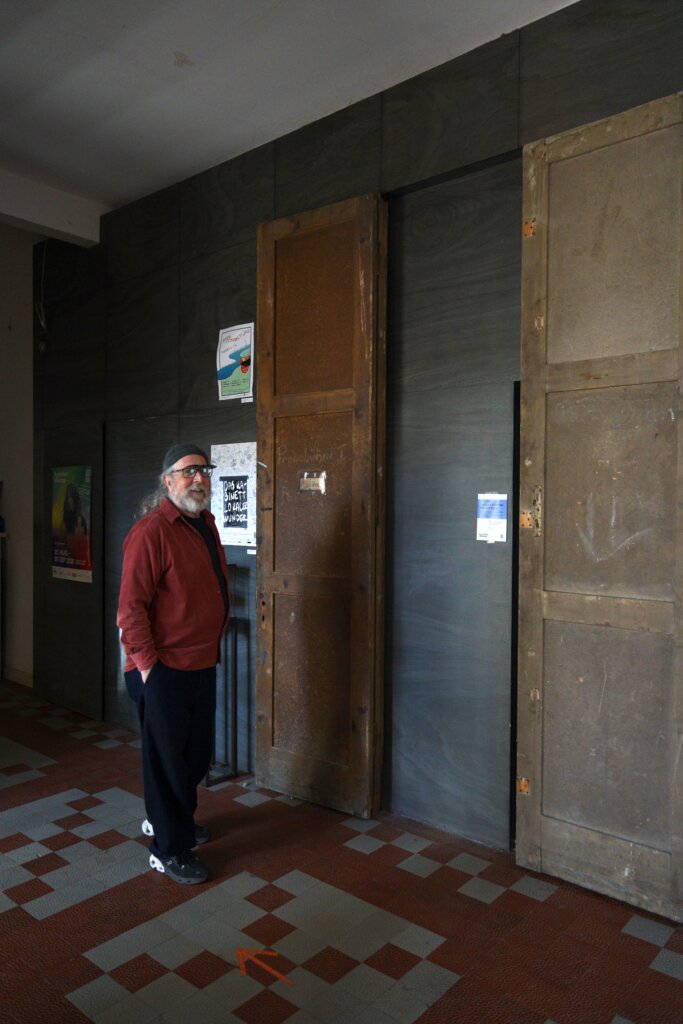
WEIMAR, Thuringia, Germany — Walking through Weimar, Germany, the legacy of the Holocaust seems inescapable. Stolpersteine — German for “stumbling blocks” — are placed outside the homes of people killed during the Shoah, essential evidence of Erinnerungskultur, or memory culture, a national commitment to memorializing, and learning from, the Nazis’ atrocities.
But this commitment is being challenged. Alan Bern, a Yiddish musician described to me as “the man who solved the Shoah,” had just returned from a press conference when I met him, where he spoke alongside local law enforcement officials about a 51-year-old man charged with the 33rd case of vandalism of the memorial stones in the Eastern German city this year.
Bern, 70, an American who came to Germany nearly 40 years ago and holds the nation’s highest civilian honor, said, “Attacks on Stolpersteine are not primarily attacks against Jews, but rather against society and, not least, against human dignity.”
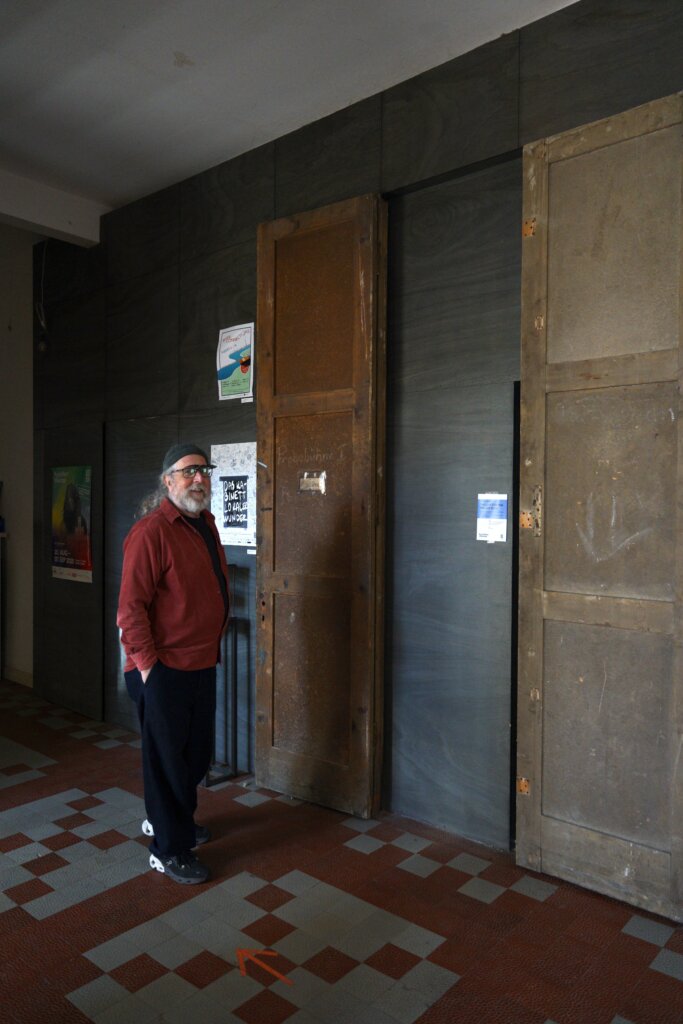
Bern, a composer, founded a school called the Other Music Academy, where he and his colleagues are creating encounters critical to the fight against Jew-hatred in Germany.
They bring together Jews and the descendants of Nazis, Israelis and Palestinians, and Germans and Syrian migrants in an attempt to apply the lessons of the Holocaust forward to the issues facing Germany today. Democracy is in the center’s DNA both in ethos and architecture — the entrance to their dance hall is a 100 year-old door from the Deutsches Nationaltheater in Weimar, where Germany’s first constitution was written and ratified.
“I believe that the encounter with otherness,” Bern said, “is essential to transforming yourself and transforming society.”
Bern’s work helps extend Germany’s memory culture, applying its lessons beyond the Holocaust to address threats against democracy posed by the far-right, which is gaining popularity around the country.
Although not all incidents of antisemitism in Germany are coming from the right, the rise of the far-right Alternative für Deutschland (AfD) party has forced a new debate over Germany’s commitment to remembering the Holocaust and other Nazi atrocities. AfD holds a plurality in Thuringia’s state parliament, and, after this year’s February elections, became the main opposition party in Germany’s federal parliament. The party’s most radical wing says that memory culture is a “guilt cult” and calls for a “180 degree turnaround” in the nation’s approach to remembering its history.
And while many Jews are deeply concerned about the right’s desire to abandon memory culture, some Jews in Germany, particularly those on the left, feel that the societal commitment to preventing another Holocaust has caused the state to police their ability to act and think freely, particularly when critiquing Israel. Since Oct. 7, 2023, Jewish activists have lost awards and speaking engagements, and have even been labeled extremists and put under surveillance by Germany’s state intelligence service.
Memory culture is not just essential to Germans, however; it’s a key for Jews around the world, who take heritage trips to concentration camps and ancestral homes there as part of memorializing the Holocaust. And worldwide, memory culture is essential to remembering global atrocities — yet its tenets are under attack. The Trump administration has criticized the Smithsonian’s approach to slavery, while Turkey refuses to acknowledge the existence of the Armenian genocide.
I went to Germany to speak with both Jews and non-Jewish Germans who are doing the work of bringing memory culture to life, to see how their work is being impacted by these political shifts, and to find out: What is lost if Germany loses its memory?
A brief history of memory culture
After the Berlin Wall fell, in 1989, the newly reunited and democratic Germany defined its national identity as a state committed to learning from the atrocities it committed in the past, thus preventing them from ever happening again.
But this devotion to the Holocaust wasn’t always the case. At the end of World War II, fewer than 15,000 Jews remained in Germany, the majority of whom went to West Germany when the country was partitioned after World War II. West Germany largely avoided accepting responsibility for the Holocaust until 1970, when Chancellor Willy Brandt visited the Warsaw Ghetto, in Poland, and laid a wreath at its memorial.
Meanwhile, under East Germany’s Soviet-style system, Nazi crimes were stripped of their antisemitic motivations and recast as offenses to communism; the small Jewish community of less than 1,000 people who remained there continued to be persecuted by the Stasi for perceived opposition to socialist values.
After the Berlin Wall came down and Germany reunified the following year, Chancellor Helmut Kohl oversaw the immigration of some 200,000 Jews from the former Soviet Union. The majority of Germany’s new Jews moved to Berlin, but others repopulated Jewish communities in the former East.
With the formation of the new German republic, the government moved back to Berlin, and in 1999, voted to construct the Memorial to the Murdered Jews of Europe in the heart of the city — next to Berlin’s famous Brandenburg Gate. They expanded concentration camp memorials to include details about the Holocaust and built a world-renowned Jewish museum designed by Daniel Libeskind. Visits to these sites became a regular part of German school curricula. A centralized national Jewish council — The Zentralrat der Juden in Deutschland, or the Central Council of Jews in Germany — today receives €22 million in government funding to serve as the official voice of Jewish people and to advocate against antisemitism across society.
Memory culture is palpable everywhere in Germany, whether in large memorials and historical sites like concentration camps, or the small plaques and reminders, like the stumbling blocks, about the Jews who once lived there.
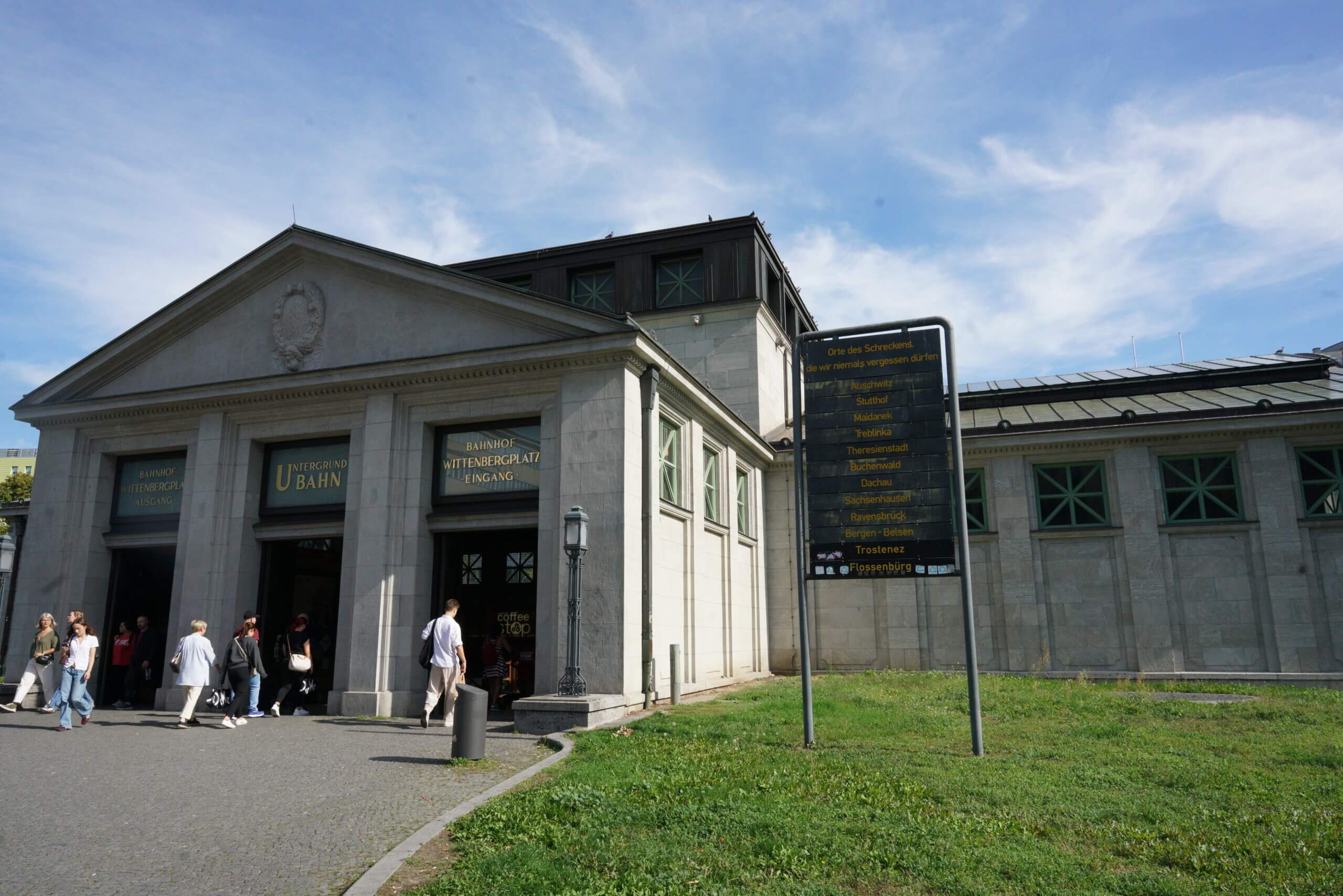
For years, however, shame over the Holocaust has muted national pride. Many Germans avoided flying their flag for fear of invoking the kind of nationalism that led to the rise of the Nazi party. (Though in the past two decades, flags have become more common at German sporting matches and events.)
That has led some, such as the far-right AfD party, to claim that memory culture has harmed Germany. Former party leader Alexander Gauland referred in 2018 to the Nazi era as a speck of “bird shit” in an otherwise grand national history, a speck that was given outsize importance.
And more recently, memory culture has become complicated by modern political concerns. In 2008, Chancellor Angela Merkel declared that supporting Israel was Germany’s “reason of state,” and the government has consistently operated with an iron-clad support for Israel as a form of reparations for the Holocaust.
But as Israel’s actions have come under increasing international condemnation since Oct. 7, Germany’s memory culture too has come under broader criticism by Jews and non-Jews alike. Some Jews in Germany are concerned over what they see as Germany abandoning Israel after Chancellor Friedrich Merz halted weapons exports to the Jewish state in August to curb the supply that could be used in Gaza. Other Jews, meanwhile, feel unable to speak out against the war given the national devotion to Israel.
And the Central Council, the state Jewish voice, believes that AfD is taking advantage of the war to inflame tensions between a new wave of Muslim immigrants and Germany’s Jews — and, in turn, win Jewish support for their party, including their belief in dismantling memory culture. Before this year’s elections, the Council circulated a letter signed by the leaders of every Jewish state organization warning that the AfD “uses Jews as an excuse to spread its racist and anti-Muslim slogans.”
The right-wing critique of memory culture in Germany
The AfD was officially designated a ‘rightwing extremist’ force by Germany’s intelligence agency, a status the far-right party is contesting in court. Still, it is the largest party in Thuringia and is poised to take over at least one state in next year’s elections. This would give it control over the educational and cultural agencies that fund memory culture in Germany, agencies it hopes to defund. Clearly, the AfD is not a fringe group.
And it is gaining increasing influence nationally and visibility internationally. Prior to their strong showing in February’s elections, both vice president JD Vance and President Trump’s ally Elon Musk encouraged German voters to vote for AfD.
The official voice of the Jewish community in Germany unambiguously says that the AfD is a growing threat to German Jews, and Jews around the world. In their 2024 annual report, the Council called the AfD a “legitimizing bridge” between the political mainstream and extremist actors — like the man who livestreamed himself ranting about the Great Replacement Theory before trying and failing to break into the synagogue in Halle with a gun in 2019, killing two people outside its doors.
“There is a will in this party to change the remembrance and the memory of National Socialism in focusing on the positive parts of German history,” said Shila Erlbaum, the Council’s director of policy. “This is an attack on Jewish history and Jewish memory.”
But not all Jews agree the AfD is such a threat. In 2018, a group of Jewish party members founded the Federal Association of Jews in the AfD (JAfD), a small caucus within the party’s 70,000 members. Today, JAfD has only 25 members, along with another 80 supporters who are not full members.
Artur Abramovych, the JAfD’s 29-year-old chairman, told me that they established the caucus after anti-immigrant demonstrations broke out in the eastern city of Chemnitz, when two Kurdish immigrants stabbed and killed a man.
Like the party’s leaders, the JAfD believes, according to its website, that “the greatest threat to Europe in the 21st century is the growth of the Muslim population” and adds that “the rise of political Islam is also primarily a threat to Jews.” While party leaders’ statements contradict AfD’s official support for Israel, the JAfD is strongly and unequivocally pro-Israel.
In January 2024, the German investigative newsroom Correctiv reported that AfD members secretly met with neo-Nazis and wealthy businessmen to plan the mass deportation of immigrants from Germany in a plot called “remigration.” The news brought hundreds of thousands of Germans into the streets in protest.
AfD initially disputed what was discussed at the meeting, though eventually party leader Alice Weidel embraced remigration as the official party platform. Though the party is once again trying to distance itself from the controversial remigration concept to create a broader appeal among the mainstream electorate, JAfD still believes that the plan is essential. Abramovych himself is an immigrant — from Ukraine — but claimed that immigration is threatening German society due to Muslim fertility rates.
Like the party’s hardliners, JAfD is also critical of Germany’s memory culture. Abramovych said that it didn’t originally hurt Jewish people, but now does “because people are forcing German politics to keep the borders open and let millions of Jew haters into the country” due to the state’s Holocaust guilt.
Germany’s immigration politics have moved to the right since Oct. 7, 2023. In an interview with Der Spiegel after the Hamas attack, former Chancellor Olaf Scholz told the magazine, “We have to deport people more often and faster.” Earlier this year, Merz’s government tightened border controls, and in October the Bundestag, analogous to the U.S. House of Representatives, voted to revoke a fast-track to citizenship law passed by Scholz.
While he smoked handrolled cigarettes and drank a cup of black coffee outside of a Ukrainian cafe in Berlin’s Friedrichshain-Kreuzberg neighborhood, I asked Abramovych if he was concerned that Jewish immigrants like himself could be deported from Germany in the future if the AfD gained power and remigration became government policy.
“What? Who would deport the Jews? That’s ridiculous,” Abramovych said.
An alternative critique of memory culture from the left
AfD had its first electoral win in the Bundestag, Germany’s lower parliamentary house, in 2017, becoming the third-largest party in the parliament. Shortly after, poet and political scientist Max Czollek published the best-selling De-Integrate!: A Jewish Survival Guide for the 21st Century, a polemic about Jewish assimilation into German culture. As a result of his edgy take on memory culture in Germany, Czollek has become something of a celebrity, and a bit of a pariah.
For Czollek, AfD is the symptom of a greater problem in Germany where the nation’s guilt over the Holocaust creates a “theater of memory” — a term borrowed from the late sociologist Y. Michal Bodemann — in which Jews play out their dutiful role on the national stage, held up by the state as model minorities, but are subject to losing its protection if they deviate from accepted norms.
Thuringian AfD leader Bjorn Höcke gained infamy when he called Berlin’s Holocaust memorial a “monument of shame,” but Czollek wrote that the idea was not new; in 1998, famed German left-wing intellectual Martin Walser called Germany’s Holocaust remembrance culture “monumentalization of shame” in his acceptance speech for the Peace Prize of the German Publishers’ Association.
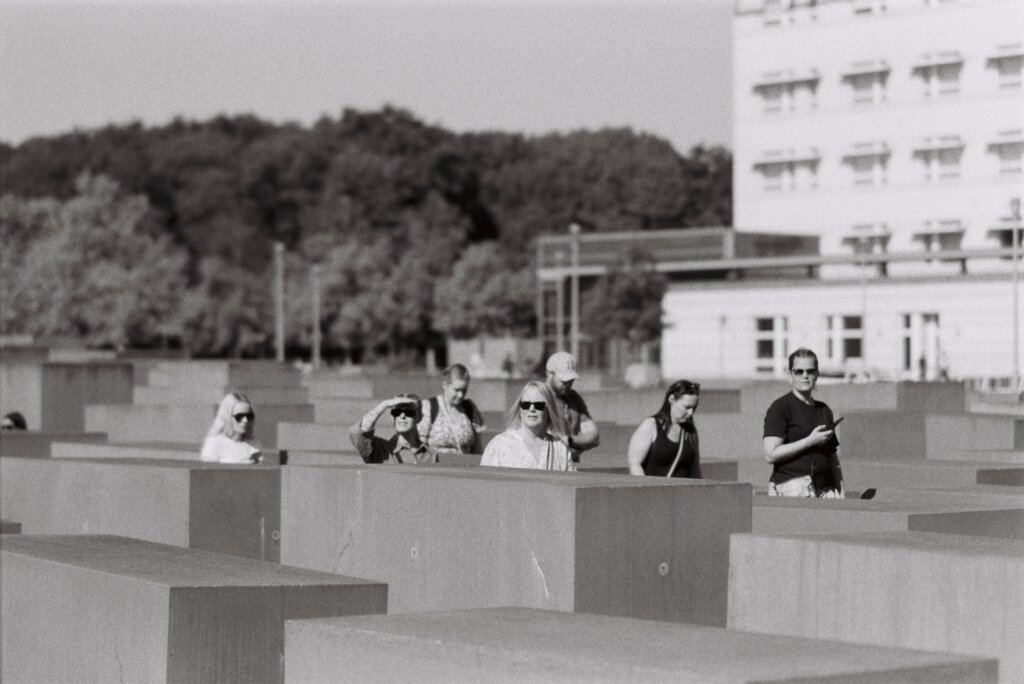
To Czollek, AfD is just the latest step in a proud German tradition of tacitly accepting Nazism, albeit by a different name, in the East.
Behind Balenciaga sunglasses outside of a Kreuzberg cafe, Czollek described his family’s life in the former East Germany, part of a very small community of Jews who stayed after the war instead of departing for West Germany, America or Israel.
“The Jewish rituals I grew up with when my father started to reconnect to this tradition is more like the old, dark, empty synagogue singing of 20 people,” he explained. “And it’s like, ‘Why are there no people?’”
Czollek was born just before the Berlin wall came down, but for his family in East Germany, the Shoah was ever present in the absence of Jews. And it was magnified by what he described as a betrayal by the communist government that took over, which declared itself, its state and all of its citizens to be anti-Nazi — even if they had previously been active members of the Nazi party.
A report by the CIA in 1959 identified over 150 former high-ranking Nazi officials then working in positions of power within the communist East German government, and called it “doubtful” that they were sincere in the “change of political thinking.”
“You have this first generation of Jewish communists who came to Germany to build a better Germany and build up on this idea of anti-fascism as a proper fighting position,” he explained. “Suddenly, a lot of former Nazis were declared anti-fascist. So this is where the memory work fails.”
After the wall came down, Czollek argues that memory culture became a branding tool for Germany to prove itself as a democracy on the international stage — a tool that never offered anything meaningful to the few East German Jews like him, and that has proved ineffective at preventing the revival of a new ethno-nationalist right.
“Memory culture has become a tool in legitimizing and justifying the pride in Germany,” he said. But, he noted, memory culture is a relatively young part of German life; its widespread adoption came, ironically, during the “Years of the Baseball Bat” in the ‘90s, when neo-Nazi violence against migrants escalated severely.
After Oct. 7, Czollek believes that memory culture warped into something else entirely; today, anyone who speaks out against Israel’s response to the attacks in Gaza faces cancellation, disinvitation or even arrest.
“Memory culture used to be a pretty self-centered process of German self-improvement and reinvention,” Czollek said. “By now, it has become a tool of dominance and hegemony.”
“It’s almost like we have done the worst, and we have remembered the best,” he continued, opining that Holocaust and concentration camp memorials boost Germany’s national self-esteem and identity as a moral actor. Then, “you can start accusing migrants of not being as good as you are.”
And Jews who criticize the government’s version of memory culture risk losing state protection.
“There’s a tempting quality to playing along with the theater of memory, because being Jewish is rewarded if you do it in a specific way,” he continued. “Being a non-aligned Jew comes with a price.”
Although solidarity between Germany’s minorities — particularly Jews and Muslims — has become strained post-Oct. 7, exacerbated by the AfD, Czollek believes it’s the only way through the crisis brought about by memory culture and the rise of the far-right.
That’s why Czollek’s new book is called Alles auf Anfang — or, Everything Back to the Beginning. It’s a search for a new culture of remembrance in German life that includes not just Jews, but recognition of other migrant victims in German society.
Currently, much of Germany’s memory culture, exemplified in memorials like the Buchenwald concentration camp, keep their focus firmly in the past. But Czollek believes that, to address the current era, Germany needs to also find ways to commemorate violence perpetrated against its other minority groups.
“If you want to have memory culture as a living, active and productive thing today, it has to be updated every generation,” he said. “Sadness or grief is not a limited resource. We can all grieve together.”
The weaponization of memory culture against Jews
Immediately after Oct. 7, Wieland Hoban, a Jewish German living in Frankfurt am Main, began demonstrating against Germany’s support for Israel, and was arrested multiple times — the first time for wearing a shirt displaying a revolutionary fist logo, which is associated with the pro-Palestinian and anti-Israel organization Samidoun that was banned in Germany a few days following the attack.
The next month, Hoban gave a speech where he said, “Germany can’t wash away its Holocaust guilt with the blood of Palestinians.” Afterwards, he was taken aside by police and charged on suspicion of Volksverhetzung — “incitement to hatred” — a charge that has been used by the German government to prosecute neo-Nazis and far-right extremists, and carries a sentence of up to five years in prison.
In Hoban’s view, memory culture had extended past its logical limits to charge him, a Jew, with a violation of the German criminal code for invoking his own history.
“They explained to me that I had mentioned the Holocaust and that in Germany, they take the Holocaust very seriously,” Hoban said. “This was a bit surreal.”
Hoban, a composer and translator, has been chairman of Jüdische Stimme für gerechten Frieden in Nahost (Jewish Voice for Just Peace in the Middle East) since 2021. He told me that, like many artists in Germany, the cause of Palestinian self-determination has been important to him.
“This occupation of Judaism, through Zionism, had just pushed me away from any identification with Jewishness,” Hoban said. But joining Jüdische Stimme helped him resolve “an inner contradiction” he felt in being Jewish and also supporting Palestinians.
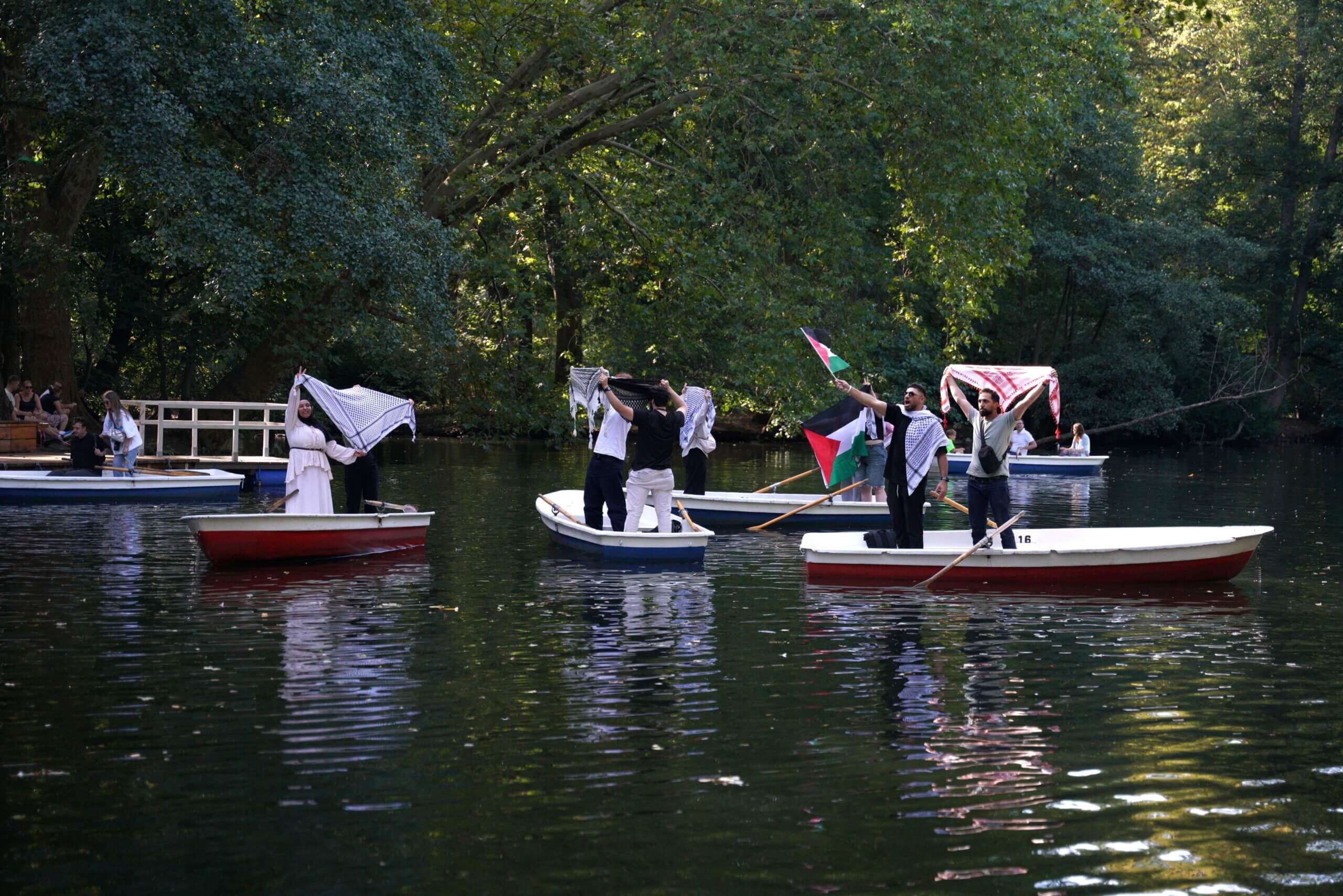
This June, Hoban received a text from a journalist asking him if he’d seen the latest report from the BfV, Germany’s domestic intelligence agency, on extremist groups in Germany. He hadn’t, but when he looked it up, Hoban learned that his organization had been labeled as a “foreign-related extremist” group.
While AfD is using the courts in an attempt to clear their domestic extremist label, Jüdische Stimme is not pushing back. Hoban doesn’t dispute the reasons for the label — he does criticize Israel and Germany’s memory culture — so his group sees no way to clear its name.
“I wish more people would just have the balls to say, ‘I don’t care if you call me antisemitic, I’m sticking to my guns here,’” Hoban said.
With the BfV’s extremist designation, Jüdische Stimme is now vulnerable to surveillance by the intelligence agency, as well as infiltration by informants.
But while the state is adamantly opposed to their cause, Hoban believes that public opinion is changing. The week that we spoke in September, a poll showed that 62% of all German voters believe Israel is committing genocide in Gaza, including a majority of both Christian Democratic Union and AfD voters. A report by the International Federation for Human Rights also found in October that Germany, among other nations, has weaponized the fight against antisemitism to suppress dissent.
And, over a year after Hoban was charged with incitement to hatred, he received a letter from the public prosecutor’s office informing him that the charge against him had been dropped.
A concentration camp gets political
The Buchenwald Memorial was established in 1958 on the site of the former concentration camp by the government of East Germany to commemorate communist resistance fighters; it did not memorialize the dead Jews. But after reunification, the Memorial’s focus expanded to include the more than 56,000 people killed and 280,000 who were imprisoned at the site, becoming a centerpiece in Germany’s tapestry of memory.
Today, Buchenwald — one of the centerpieces of Germany’s memory culture — finds itself caught in the middle of the debate over how to remember the Holocaust. It’s using its mission to confront its dark history in a new way: fighting back against politicians who distort the Holocaust.
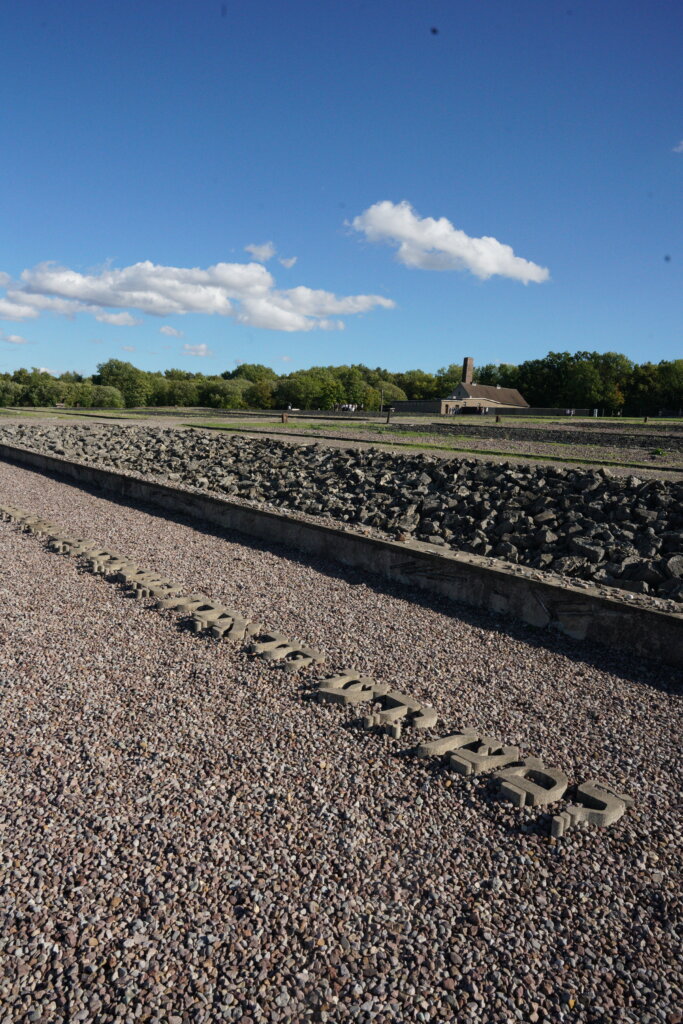
When an AfD member ran for mayor of Nordhausen, a city in Thuringia, in 2023, the Memorial’s official social media pages called him out online for dog whistling to right-wing extremists, invoking a false Holocaust-distorting conspiracy theory. The post changed the course of the election; in the first round of elections, the candidate had more than 45% of the vote, but after the Memorial’s statement, he failed to win in the second round.
“Many older inhabitants of Nordhausen who had not voted for many years said, ‘No, we don’t want to have a Holocaust denier as a mayor,’” the memorial’s director, Jens-Christian Wagner, said in an interview.
Last year, Wagner pursued a more extensive outreach with 300,000 letters mailed to seniors in Thuringia ahead of the state’s elections. The letters warned of the ways in which AfD party leaders have used Nazi language and distorted history.
The AfD fought back, taking the Memorial to court and accusing the Memorial of interfering in “political decision-making.” They lost.
“The court says explicitly that we can’t be neutral against any kind of Holocaust distortion,” Wagner explained to me.
With that mandate, Wagner now considers it his duty and the mission of the Memorial to combat Holocaust distortion, especially when it might affect elections. The Memorial has a particular interest; it’s located in Thuringia, where the AfD is gaining power, and it could lose its funding if the party wins control.
“With our interventions, we don’t think that we can change the positions of the AfD,” Wagner said. “We want to reach all these people who are not specifically voting for the AfD, who are in the gray zone, who can be rescued for democracy.”
Looking towards Germany’s future generations
The AfD has lately focused on reaching youth voters, spending heavily on digital outreach. As a result, young people in Germany are becoming increasingly anti-migrant, embracing far-right political ideas that were once verboten in Germany for being too close to Nazism.
Despite the Memorial’s successful interventions to deter adults from voting for AfD, Wagner is concerned about the rightward shift of younger generations, who are less likely to treat information from a Holocaust memorial with reverence — or even respect its history.
The director described young people who visit the Memorial on school trips displaying the Hitler salute, shouting “Sieg Heil” and photographing each other in front of crematory ovens.
“There were some right-wing young people in every school class for years, but these were only one or two, and the majority was against them, and this has completely changed,” Wagner said. “Now, spreading Holocaust distortion, being right-wing, is common sense in these school classes, and it’s very, very difficult for our educators to have a discourse with them.”
The Memorial has been attempting to revise their educational programming to make visits longer and more in-depth, and even built a youth hostel on the site so that school groups can stay and have extended experiences that they hope will make a lasting impact.
Alan Bern, of the Other Music Academy, also is also worried about the younger generations; he sees resonating with Germany’s youth as one of his most urgent and important challenges.
“Young people in Weimar have almost no real relationship to what it is that we’re doing,” Bern said. “So when they’re told ‘You shouldn’t be antisemitic,’ it’s just some adult telling them ‘Don’t do this.’”
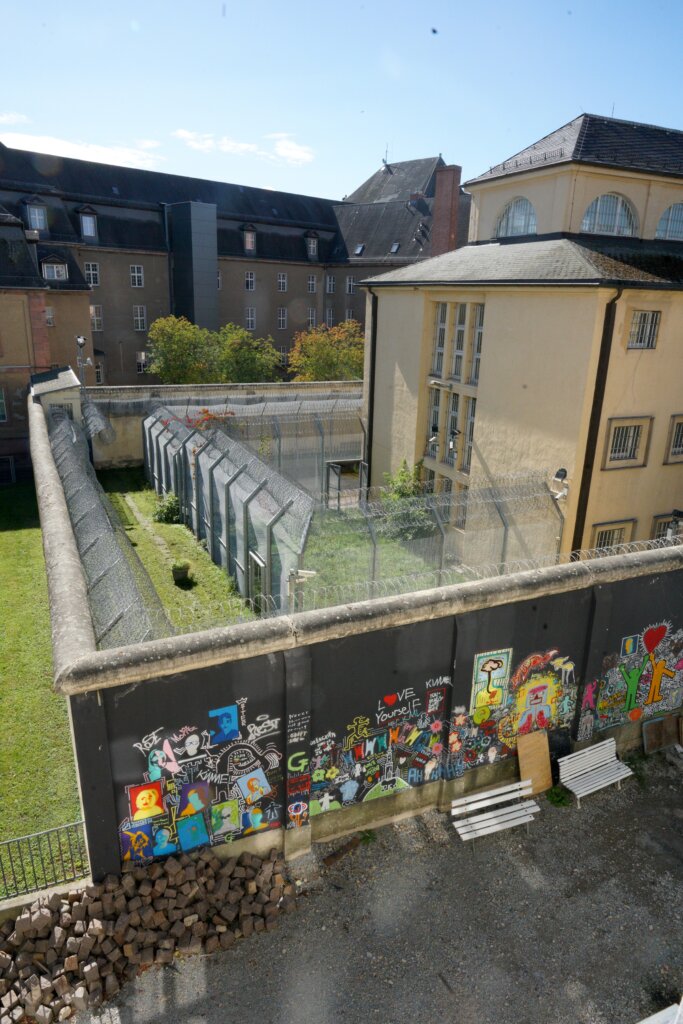
Like at Buchenwald, where the education department has placed its hopes for the future into its youth hostel, Bern wants to transform the former youth prison next to Other Music Academy into a dormitory of sorts where young people can stay for several days. The dichotomy of the prison’s barbed wire courtyard and its painted exterior wall, which artists have covered with colorful Keith Haring murals, pose a striking question about the direction of Germany’s future: Which way?
Pointing towards the floor and then to the prison across the driveway, Bern said, jokingly: “It’s either this or that.”
Challenged from both the left and the right, it’s unclear what is next for Germany’s memory culture. For now, the younger generations are caught in the middle.
While waiting at the bus stop to head back from Buchenwald, I found myself unexpectedly sandwiched in the middle of a high school tour group as they posed for a class photo. After we all boarded the bus, about half of them sat quietly — maybe contemplating the horrors they’d just seen, maybe dozing off. But as we drove down the hill toward Weimar, the bus also filled with the sound of laughter.
The future of memory culture, ultimately, will be up to them.
The post How Germany’s Holocaust remembrance culture kicked off a democratic crisis appeared first on The Forward.
Uncategorized
Israeli Christian Leader: Tucker Carlson ‘Doesn’t Want the Truth,’ Endangers Christians Elsewhere by Lying About Israel

Tucker Carlson speaks on first day of AmericaFest 2025 at the Phoenix Convention Center in Phoenix, Arizona, Dec. 18, 2025. Photo: Charles-McClintock Wilson/ZUMA Press Wire via Reuters Connect
Firebrand podcaster Tucker Carlson drew a barrage of heat from Israelis after claiming he was “detained and interrogated” during a brief stop at Ben Gurion Airport on Wednesday, with former Prime Minister Naftali Bennett calling him “a chickens**t” and “a phony” and an Israeli Christian leader describing him as “an enemy of Israel” for lying about the country’s treatment of Christians.
Shadi Khalloul, founder of the Israeli Christian Aramaic Association and a former Knesset candidate, accused the former Fox News host-turned-far-right conspiracy theorist of “destroying Christian-Jewish relations” all over the world and “endangering the persecuted Christian community in the Middle East” by portraying Israel as hostile to Christianity.
“The truth is exactly the opposite,” he said, describing Christians in Israel as enjoying freedom and equal opportunity.
In Khalloul’s telling, Carlson is choosing scenes and storylines that travel well online, then skipping the reporting that might complicate them.
“Tucker Carlson doesn’t want the truth. The truth doesn’t exist in his lexicon,” Khalloul told The Algemeiner.
Earlier this month, Khalloul invited Carlson to a tour of Christian communities and holy sites in Israel, including a meeting with his brother-in-law, the head of the Maronite Church of Israel, but received no response.
I invited @TuckerCarlson to take advantage of his upcoming visit to Israel and meet our thriving Christian community – to see with his own eyes the people and realities he speaks about so confidently and so often on his platform.
This letter was sent a week ago to every email… pic.twitter.com/lcBiecCtUx
— Shadi khalloul שאדי ח’לול (@shadikhalloul) February 17, 2026
“If he [Carlson] was really willing to help, he would come interview us, hear our views, our narrative,” Khalloul said, adding the podcaster would then be able to “expose the oppression of Christians in Lebanon, in Iraq, in Syria, and under the Palestinian Authority by a radical Islamic propaganda agenda,” rather than “talking about me and my community as being persecuted by Israel.”
He pointed to anti-Christian violence in Syria, including a recent church bombing in Damascus, and to the arrest of Maronite official Moussa el-Hajj in Lebanon after he was arrested by Hezbollah operatives at the Lebanese border carrying money and medicine sent from Israel’s Christian community.
Christian communities all over the region are continuing “to shrink while we here are thriving and increasing in numbers and happily living in Israel,” Khalloul said.
Khalloul’s comments came after Carlson spent only a few hours in Israel on Wednesday for an interview with US Ambassador Mike Huckabee and chose not to leave the Ben Gurion Airport facility before flying out of the country.
Bennett described the polemical commentator’s visit as a staged drive-by meant to give him a basis for future anti-Israel commentary.
“Tucker Carlson is a chickens**t,” Bennett posted on the social media platform X.
Tucker Carlson is a chickenshit.
The guy who’s been spouting lies about Israel for the past two years,
landed today at Ben Gurion airport,
took a quick picture in the logistics zone,
tweeted it to pretend he’s actually IN Israel (so he can later claim that he’s a serious… https://t.co/ZWZ8aY7BAG— Naftali Bennett נפתלי בנט (@naftalibennett) February 18, 2026
Carlson, who has been “spouting lies about Israel for the past two years,” didn’t even step foot in the country, Bennett wrote, and instead posted a photo taken in the airport logistics zone to “pretend he’s actually IN Israel (so he can later claim that he’s a serious reporter who toured Israel).”
He “whined” and “made up a story that he’s being supposedly harassed by our security (didn’t happen),” he continued.
“Next time he talks about Israel as if he’s some expert, just remember this guy is a phony!” Bennett concluded.
Carlson’s version, carried by outlets including the New York Post and the Daily Mail, said airport security took passports and “hauled” his executive producer into a room and interrogated him about the interview Carlson had just recorded with Huckabee.
Huckabee pushed back publicly, writing on X: “EVERYONE who comes in/out of Israel (every country for that matter) has passports checked & routinely asked security questions.”
Israel’s Airports Authority also rejected Carlson’s account, saying he and his team were not “detained, delayed, or interrogated” and were only asked “a few routine questions” in a side room inside the VIP lounge “solely to protect their privacy.”
“No unusual incident occurred,” the authority said, adding that it “firmly rejects any other claims.”
Carlson’s airport detention story was “another lie” by “someone who is always inventing stories,” according to Khalloul.
Carlson’s own platform promoted the trip as a fact-finding mission. In a monologue titled “We’re headed to Israel. Here’s why,” his site said he was traveling to “get answers to questions that no one will answer.”
His show page also carried an episode billed as “Israel’s Purging of Christians From the Holy Land and the Plot to Keep Americans From Noticing,” part of a series focused on Christian treatment by the “US-funded Israeli government.”
Commentators on social media pointed out that Carlson’s posting “Greetings from Israel” from an airport logistics zone, then flying out, does not amount to visiting the country in any ordinary sense.
Carlson’s brief trip to Israel contrasts with his interview of Russian President Vladimir Putin in 2024, when he spent multiple days in Russia praising the country on video and infamously marveling at the use of locks on shopping carts — a common feature in Europe.
The podcaster’s visit to Israel also differed from his trip to Doha in December, when he interviewed Qatari Prime Minister Mohammed bin Abdulrahman bin Jassim Al Thani and revealed his plans to purchase a home in the country. Qatar has been a long-time backer of the Muslim Brotherhood, including its Palestinian offshoot Hamas, an internationally designated terrorist group.
Carlson has ramped up his anti-Israel content over the last year, according to a study released in December by the Jewish People Policy Institute (JPPI), which tracked the prominent far-right podcaster’s disproportionate emphasis on attacking the Jewish state in 2025.
In September, for example, the podcaster appeared to blame the Jewish people for the crucifixion of Jesus and suggest Israel was behind the assassination of American conservative activist Charlie Kirk.
Uncategorized
Australian Bar Shut Down for Displaying Posters of Netanyahu, Putin, Trump in Nazi-Like Uniforms

Adolf Hitler in Nuremberg in 1938. Photo: Imperial War Museums.
A live music bar and cafe in Australia was shut down by local police on Wednesday for displaying posters that depict world leaders and others, including Israeli Prime Minister Benjamin Netanyahu and US President Donald Trump, wearing Nazi-like uniforms.
The Dissent Cafe and Bar in Canberra Central said in a Facebook post that ACT Policing, the community policing arm of the Australian Federal Police, shut down the venue for two and a half hours on Wednesday night. Police said they were investigating a complaint about possible hate imagery relating to five posters in the venue’s window display. A scheduled performance at the bar and cafe was also canceled because of the shutdown.
ACT Policing said in a statement on Thursday that it declared the cafe a crime scene and officers would investigate whether there was a breach of new Commonwealth law about hate symbols. Police noted that they asked the venue’s owner to remove the posters and he refused.
“Officers attended the premises and had a discussion with the owner, with officers seeking to remove the posters as part of their investigation into the matter. The owner declined this request and so a crime scene was established,” read the police statement. “Five posters were subsequently seized and will be considered under recently enacted Commonwealth legislation regarding hate symbols.”
The Dissent Cafe and Bar had displayed in its front windows posters depicting Netanyahu, Trump, Russia’s President Vladimir Putin, US Vice President JD Vance and Tesla co-founder Elon Musk in Nazi-like uniforms. The posters were created by the artist group Grow Up Art and underneath them were signs in the window that said “Sanction Israel” and “Stop Genocide.” Grow Up Art displayed the same images as part of a billboard poster campaign last summer and they are also sold on t-shirts. The artist group nicknamed the men in the posters collectively as “The Turd Reich,” a play on the Third Reich, the name for the Nazi dictatorship in Germany under Adolf Hitler’s rule.
Dissent Cafe and Bar has defended the artwork, saying it is “clearly and obviously parody art with a distinct anti fascist [sic] message.”
“In what is obviously harassment the ACT police have declared a crime scene at Dissent and tonight’s gig is unfortunately canceled,” Dissent Cafe and Bar wrote on Facebook when the closure happened on Wednesday.
The posters have since been placed back in the windows of the live music bar, but the images are now covered with the word “CENSORED” in red. ACT Policing said on Thursday they are still investigating the posters and are also “seeking legal advice on their legality.”
“ACT Policing remains committed to ensuring that alleged antisemitic, racist, and hate incidents are addressed promptly and thoroughly, and when possible criminality is identified, ACT Policing will not hesitate to take appropriate action,” police added.
Uncategorized
At Board of Peace Debut, Trump Announces Global Commitments for Gaza Reconstruction

USPresident Donald Trump speaks at the inaugural Board of Peace meeting at the US Institute of Peace in Washington, DC, US, Feb. 19, 2026. Photo: REUTERS/Kevin Lamarque
US President Donald Trump told the first meeting of his Board of Peace on Thursday that nations had contributed $7 billion to a Gaza reconstruction fund that aims to rebuild the enclave once Hamas disarms, an objective that is far from becoming a reality.
The disarmament of Hamas terrorists and accompanying withdrawal of Israeli troops, the size of the reconstruction fund, and the flow of humanitarian aid to the war-battered populace of Gaza are among the major questions likely to test the effectiveness of the board in the months ahead.
The meeting in Washington came amid a broader push by Trump to build a reputation as a peacemaker. It also took place as the United States threatens war against Iran and has embarked on a massive military buildup in the region in case Tehran refuses to give up its nuclear program.
The Board‘s founding membership does not include some key US Western allies concerned about the scope of the initiative.
In a flurry of announcements at the end of a long, winding speech to representatives from 47 nations, Trump said the United States will contribute $10 billion to the Board of Peace. He did not say where the money would come from or whether he would seek it from the US Congress.
MOSTLY MIDDLE EASTERN MEMBERSHIP
Trump said contributing nations had raised $7 billion as an initial down payment for Gaza reconstruction. Contributors included Kazakhstan, Azerbaijan, United Arab Emirates, Morocco, Bahrain, Qatar, Saudi Arabia, Uzbekistan, and Kuwait, he said. The membership is mostly made up of Middle Eastern countries, plus leaders from outside the region who may be looking to gain favor with Trump.
Estimates for rebuilding Gaza, which was reduced to rubble after two years of war, range up to $70 billion.
Trump proposed the board in September when he announced his plan to end Israel’s war in Gaza. He later made clear the board‘s remit would expand beyond Gaza to tackle other conflicts worldwide, a point he reiterated on Wednesday by saying it would look into “hotspots” around the world.
Trump said FIFA will raise $75 million for soccer-related projects in Gaza and that the United Nations will chip in $2 billion for humanitarian assistance.
The Board of Peace includes Israel but not Palestinian representatives. Trump‘s suggestion that the Board could eventually address challenges beyond Gaza has stirred anxiety that it could undermine the UN’s role as the main platform for global diplomacy and conflict resolution.
“We’re going to strengthen the United Nations,” Trump said, trying to assuage his critics, even though the United States is in arrears on making payments.
Trump said Norway would host a Board of Peace event, but Norway clarified it was not joining the board.
IRAN SABER-RATTLING
Even as he talked up himself as a man of peace, Trump rattled sabers against Iran.
Trump said he should know in 10 days whether a deal is possible to end a standoff with Tehran. “We have to have a meaningful deal,” he said.
Trump said several nations are planning to send thousands of troops to participate in an International Stabilization Force that will help keep the peace in Gaza when it eventually deploys.
Indonesian President Prabowo Subianto announced his country would contribute up to 8,000 troops to the force.
The plan for the force is to begin working in areas Israel controls in the absence of Hamas disarmament. The force, led by a US general with an Indonesian deputy, will start in Israeli-controlled Rafah. The aim is to train 12,000 police and have 20,000 troops.
“The first five countries have committed troops to serve in the ISF – Indonesia, Morocco, Kazakhstan, Kosovo, and Albania. Two countries have committed to train police – Egypt and Jordan,” International Stabilization Force commander Army Major General Jasper Jeffers said on Thursday.
HAMAS DISARMAMENT A KEY ISSUE
Hamas has been reluctant to hand over weaponry as part of Trump‘s 20-point Gaza plan that brought about a fragile ceasefire last October in the two-year Gaza war.
Trump said he hoped the use of force to disarm Hamas would be unnecessary. He said Hamas had promised to disarm and it “looks like they’re going to be doing that, but we’ll have to find out.”
Israeli Prime Minister Benjamin Netanyahu said in Israel that Hamas will be disarmed one way or the other. “Very soon, Hamas will face a dilemma – to disarm peacefully or disarmed forcefully,” he said.
In Gaza, Hamas spokesperson Hazem Qassem said in a statement that the real test of the Board of Peace “lies in their ability to compel the occupation to halt its violations of the ceasefire, to oblige it to meet its obligations, and to initiate a genuine relief effort and launch the reconstruction process.”
The Board of Peace event had the feel of a Trump campaign rally, with music blaring from his eclectic playlist that included Elvis Presley and the Beach Boys. Participants received red Trump hats.
Hamas, which has resumed administration of nearly half the enclave, says it is ready to hand over to a US-backed committee of Palestinian technocrats led by Ali Shaath, but that Israel has not allowed the group into Gaza. Israel has yet to comment on those assertions.
Nickolay Mladenov, a Bulgarian with a senior role in the Board of Peace, said at the meeting that 2,000 Palestinians have applied to join a new transitional Palestinian police force.
“We have to get this right. There is no plan B for Gaza. Plan B is going back to war. No one here wants that,” said US Secretary of State Marco Rubio.


